German Army Officer’s Saber
CATEGORY: Version
SKU: 20.GOR.04.02.001.000
Estimated market value:
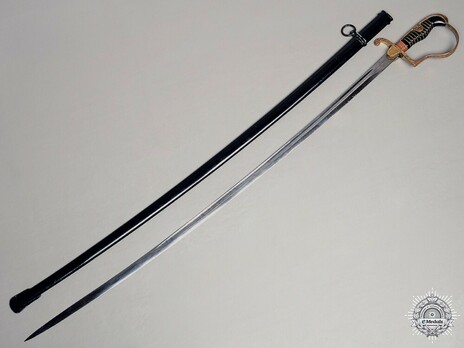
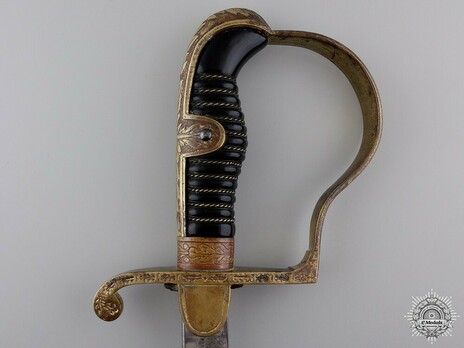
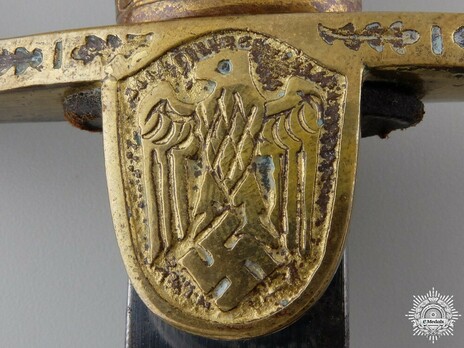
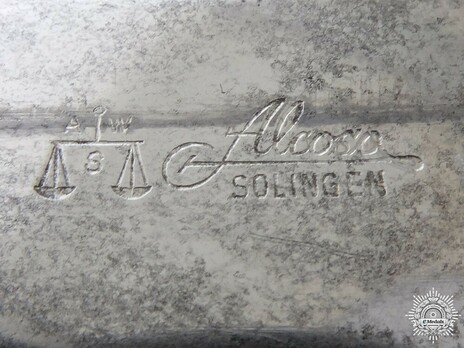
Estimated market value:
Measuring 1,002 mm, with the scabbard on, this sword features an 865 mm long, slightly-curved, fullered, nickel-plated steel blade, magnetic, with a blade spine and a single dull edge, the blade remaining bright and crisp, and having a semi-sharp tip. The blade's ricasso is maker marked Alexander Coppel GmbH (Alcoso), Solingen, with the company's balance of scales insignia. It retains its crossgraining, exhibiting light wear, along with faint scratches common to extraction and return to the scabbard, natural shine, near extremely fine. Brown leather buffer pad, the face of which is dyed dark brown, has hardened but remains intact. Heavy brass gilt steel crossguard with quillon, finely-detailed Army eagle with its talons clenching a wreathed swastika insignia flanked by oak leaves on the crossguard, the reverse of the crossguard with oak leaves. Black celluloid plates with eleven rows of gold-coloured springy wire in the recesses of the ribbed grip, the plates embedded onto either side of the handle and held in place via a long central pin that passes through the supporting guard, running from the crossguard and wrapping around the pommel, joining on to the opposite end of the crossguard, forming the handle. The guard, pommel and handle are adorned with an oak leaves and acorn motif. The sword measures 982 mm in length and weighs 544 grams overall, exhibiting surface wear along with residue in the recessed areas of the handle from cleaning. The scabbard has a durable black painted metal body, magnetic, with flattened u-shaped finial and locket, suspension ring and bracket protruding from the wrap-around loop, weighing 467 grams and measuring 25.5 mm x 882 mm, exhibiting scattered surface wear and scratches in the black paint from active use.
By the time of the Second World War the sword was no longer a combat weapon. Its relevance had been reduced to a symbol of tradition and an indicator of rank and status. It was mostly worn during garrison duty or on the horse during a mounted parade. Because of this it was also considerably smaller and lighter than swords of earlier days that were actually made for combat.
Both the official versions of the Officer’s Saber and the Enlisted Man’s Saber are rather plain and have no visible design motif or outside markings. The difference between the two sabers is mainly in size and weight. Officer’s Sabers came in three different sizes, dependent on the height of the wearer. The Officer’s Saber Size 1 and 2 is 11 or 5 cm longer than the Enlisted Man’s Saber, but 3 cm shorter for Size 3. It is also 320 to 365 gr lighter.
Side-arms were often worn with portepees, which, depending on the wearer's unit and branch, came in specific colours.
Unofficial versions made by private companies could be purchased, which was a common occurrence, especially for Officers. These came in many varieties and were much more ornate, with pommels in the shape of animal heads, engraved langets, or etched blades.
The designers for the privately purchased unofficial sabers include but may not be limited to: ALCOSO (Alexander Coppel, Solingen); Clemen & Jung; Eickhorn; Richard Herder; F. W. Höller; E&F Hörster; Robert Klaas; Carl Julius Krebs; P. D. Lüneschloss; Ernst Pack & Söhne; Puma; Paul Seilheimer; Emil Voos; Weyersberg, Kirschbaum & Cie. (WKC); Anton Wingen Jr.
All makers are from the city of Solingen.

Comments
Sign in to comment and reply.
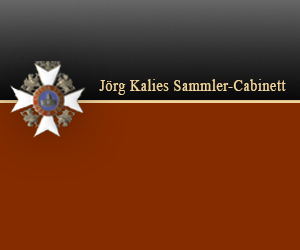

Scroll Top